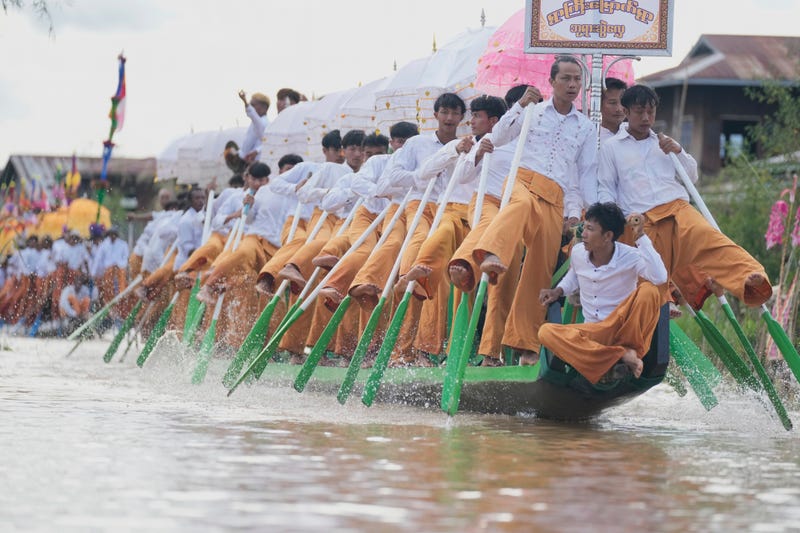
INLE LAKE, Myanmar (AP) — Myanmar’s Phaung Daw Oo Pagoda Festival, a major Buddhist celebration and world-class tourist attraction, has seen some of its celebratory spirit diminished, with locals and visitors citing a confluence of challenges including the COVID-19 pandemic, political upheaval and natural disasters — including a recent devastating earthquake.
Crowds nonetheless flocked this week to enjoy the festivity, with a spectacular gold-gilded barge at its center and scores of smaller wooden boats manned by fishermen from the Intha ethnic minority who practice a unique style of rowing while standing with one leg wrapped around a single oar. The ornate barge, with a golden image of the mythical Karaweik bird on its bow, hauls four statues of Buddha to 21 villages around the lake for people to pay homage to them.
The picturesque festival takes place over more than two weeks on mountain-fringed Inle Lake in southern Shan state, a popular tourist hub about 420 kilometers (260 miles) northeast of Yangon.
The coronavirus pandemic curbed the celebration in 2020 and the army’s ouster of the elected government of Aung San Suu Kyi in 2021 — resulting in civil war over much of the country — led to the event being suspended again, to resume only in 2023. Widespread flooding last year again caused its cancellation.
The celebration resumed this year, but it was overshadowed by a 7.7 magnitude quake on March 28 that killed more than 3,800 people and caused widespread destruction.
While central Myanmar bore the brunt of the quake, Inle Lake was also significantly affected. Many houses built on wooden stilts in the water collapsed, leaving up to 90 percent damaged or destroyed in some villages around the lake. Local estimates, none official, put the death toll at between 50 and 90. According to a report by the consultancy E Guard Environmental Services, more than 13,000 people in the area were impacted.
Many or most of the houses have been rebuilt or repaired in the traditional style, but not to the highest standards, Nyi Nyi Zaw, a 42-year-old ethnic Intha from Heyarywarma village, told The Associated Press.
He said the scarcity of local craftsmen skilled in traditional construction techniques, coupled with the urgency of repairs, was the problem.
“Not all the houses are standing straight, if you look carefully. To get them back to their original state, they will have to be repaired when the lake dries up in the summer,” said Nyi Nyi Zaw, whose own house was among those damaged.
“The tourism industry in Inle collapsed after the pandemic, then came the political change in 2021, and there was the flood last year," noted Nyi Nyi Zaw, a former tour guide who turned to general labor after the pandemic. “It was like miseries overlapping one upon another.”
Ma Win, a traditional textile seller from Inle Lake, said locals continue to hold the festival despite poor business because it is a long-standing tradition passed down through generations.
“It’s been years since the Buddha statues came to our village. So we are participating as much as we can,” said Ma Win as she welcomed the golden barge.